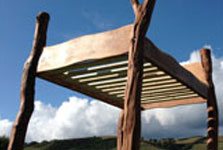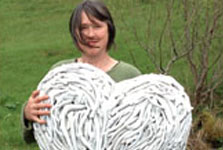Guide to Using your Compost Toilet

We though it might be helpful to publish on-line our User’s Guide to Free Range Compost Toilets, which we send out to all new compost toilet clients.
 Getting Started
Getting Started
For the composting process to work well, there are some key ingredients that should be added into the mix, but the exact ‘recipe’ you use will depend on what you have most readily available.
- It’s a good idea to add a handful of worms in the bottom of your wheelie bin before you begin, as they are nature’s great composters and will get the composting process working well from the start. Common earthworms are great, or whatever you can dig up; you don’t need to buy any special worms.
- Along with the worms, we recommend adding a bucket of kitchen or garden compost, or a bag of animal manure (such as chicken poo), which will also work as a compost activator and speed up the composting process.
- Make sure you have a box of ‘soak’ and a scoop (a plastic cup works well) ready for use inside, next to the toilet. This could be sawdust, straw, wood chips, shredded paper or earth. You will need to add one cup of soak after each poo. No soak is needed with a wee. We put a sign on the inside of the door saying, “One scoop per poop; none with a pee”.
The soak is very important for a healthy (and odour-free) compost pile because the composting critters, who are doing the hard work of turning our poo into lovely useable compost for us, like to eat a balanced diet of carbon and nitrogen. Humanure contains a lot of nitrogen, so a good amount of carboniferous material is needed otherwise the excess nitrogen is released in the form of ammonia, which is very smelly.
As well as absorbing liquid, the soak also allows oxygen into the pile, which is vital for the composting critters and allows the compost to decompose aerobically. Without a soak, the pile will decompose anaerobically and produce methane, ammonia and hydrogen sulphide – all smelly and not very useful.
Urine Separation
All Free Range Loos come with a wee separator, which is used to divert the urine away from the wheelie bin and keep it separate from the poo. Like the use of a soak, urine separation helps to keep the solid wastes odour free and optimise the composting process.
You will need to attach some flexible ribbed hose to the bottom of your urine separator with a jubilee clamp, to carry the urine away. You then have two choices of what you do with the urine.
- Collect the urine in a large plastic container. This system enables you to use the urine as a liquid fertiliser on your plants. (See more below)
- Create a ‘soak away’. With this system, the end of your pipe runs a little way underground and the urine is released directly into the earth, where it can be used to feed fast growing trees such as ash and willow. Creating an effective soak away requires some planning and consideration of the surrounding environment. Please contact us for more advise if you intend to set up a soak-away.
Maintaining your Composting Toilet
Once you are all set up, the Free Range wheelie bin system of composting is pretty hands-off and does not require a lot of maintenance. There are nevertheless a number of jobs that need to be carried out periodically to ensure that the system remains healthy and odour-free.
- Add an extra handful of worms and another bag of garden / kitchen / animal compost periodically as the wheelie bin fills up (every two-three weeks, or less if your toilet is used only occasionally). This will help accelerate the composting process.
- Add an extra bag of whichever soak you are using from time to time. This helps to trap air in the mixture, which again speeds up composting.
- Slide out the urine separator once in a while and give it and the pipe work a good rinse. We have designed the separator ourselves with a large enough pipe that it should not get clogged up with soak, but a regular clean will help detract flies and prevent any unpleasant smells.
- If you are collecting the urine, you need to check the levels of your urine container and empty it before it overflows! Urine actually contains more nutrients in it than poo, and as such is a wonderful resource in the garden. You can dilute it 1:10 in water and pour it around your plants and vegetables, or you can even use it neat, as we do, but be aware that undiluted it is potent stuff!
- Be prepared for when your first wheelie bin is full. You need to have at least two wheelie bins, so that the full bin can be left to stand for a few months before you empty it into a composting box. Doing this means that you never have to interact with fresh poo. You will need to have a composting box in place for when you are ready to empty the full bin.Wheel your full bin out and put it to one side with a label on, then wheel your second bin into place. The advantage of the wheelie bin system is that you can rotate the bins as quickly as they fill up. More people means morebins. On average, using the composting toilet everyday, it takes one adult 150 days to fill up a bin. So a group of six people would fill a bin in about 25 days, and a group of 15 people would fill a bin in about two weeks. If the toilet is used only occasionally, it will take much longer to fill the bin.
Managing your Compost
Left in a wheelie bin, the composting process will take around a year to fully break down into useable compost. However it will break down much faster if it is emptied into a standard composting box, which allows the air to circulate and aerobic composting to happen more rapidly. In a composting box the compost should break down and be usable in about six months.
A 1m x 1m composting box will hold at least six wheelie bins’ worth of humanure. Left to stand, a full wheelie bin reduces in bulk by half over 6 months, and left in the composting box it reduces much faster, so will be able to accommodate more over time.
After it has been left to stand for the required amount of time, all the pathogens have been destroyed and the compost inside is safe to handle and ready to use on your garden or allotment. Human pathogens don’t like conditions outside the human body, so almost all will be dead after a few hours. Only one type of roundworm egg can survive a year-long decomposition period but, even though it is a tiny risk, we recommend using the compost on fruit trees and bushes, rather than the vegetable garden.
Good luck!
For more information about how to build a compost toilet visit our main website






